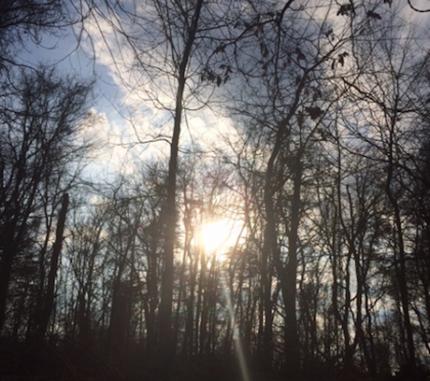
By the time a small group of us gathers for our Advent and Winter Solstice retreat The Gift of Story in early December, it is probable that the U.S. presidential election will at last be over. Perhaps the ads, mailings, rallies, debates, harangues, solicitations, and polls will have ceased. What is certain, however, is that the rancor and bitterness, the isolation and anger, the pain and suffering here in this country, in the Middle East, and around the globe will have dissipated not at all. The forces that marred the summer and now the fall don’t care that the holy seasons of Advent and the Winter Solstice promise light in the darkness. Fear and anger rampage on through the world. We will gather in December with full and breaking hearts.
Every season at Rolling Ridge has its peculiar beauty. Even the chill days of November and December drape the forest in hues of soft gray and brown. Overhead intertwining branches trace intricate patterns against a pale sky. The quiet in the air, the cushion of leaves underfoot, the myriad of patterned tree trunks, weave a mantle of hushed and stately presence. We live and breathe daily on the frontier where wonder converses with pain.
In our retreat, we will listen, within the silence, to the telling of stories, some from the gospels and some from other cultures and histories: stories about stars and visions, winter nights, gifts given, angels, journeys, childbirth, and epiphanies. We will hear, and perhaps tell aloud, stories rising within us: out of our faith, our doubt, and our dreams echoed back to us by the wild and animate Earth.
Clarissa Pinkola Estes says, “…the telling of story is … an essential, spiritual practice… Most [stories] are not … simple entertainment…they are conceived of and handled as a large group of healing medicines, each requiring spiritual preparation and certain insights by the healer as well as by the subject…”
She continues, “It must be noted also that many of the most powerful medicines, that is stories, come about as the result of one person’s or group’s terrible and compelling suffering. For the truth is that much of story comes from travail. And yet, paradoxically, these very stories that rise from deep suffering can provide the most potent remedies for past, present, and even future ills.”
What strikes me is the astonishing resonance of story within the cavern of time. Two thousand years ago, around 4 BCE, the Middle East was in travail, just as now. That year, Herod the Great died, and all over the region, people took the chance to rise up in resistance to Roman tyranny. To quash the rebellion, Varus, the Roman governor in Syria, sent legions: 18,000 elite troops accompanied by 2,000 auxiliary cavalry and 1,500 auxiliary infantry. Their staging area was Ptolemais (now Tolmeita, Libya) on the Mediterranean coast. Varus “at once sent a detachment of his army into the region of Galilee adjoining Ptolemais, under the command of his friend Gaius; the latter routed all who opposed him, captured and burnt the city of Sepphoris and reduced its inhabitants to slavery.” Nazareth was a tiny hamlet about four miles, or an hour and a half’s walk away, over the ridge and across the floor of the Beth Netopha valley. Marcus J. Borg and John Dominic Crossan write in The First Christmas:
For Nazareth, in 4 BCE, either there was timely flight to hiding places well known to the local peasantry, or its males were murdered, its females raped, and its children enslaved. If they escaped, the little they had would be gone when they returned because, as another rebel said, when you had nothing, the Romans took even that. “They make a desert and call it peace.”
Jesus grew up in Nazareth after 4 BCE…The major event in his village’s life was the day the Romans came. As he grew up…he could not not have heard, again and again and again, about the day of the Romans—who had escaped and who had not, who had lived and who had died.
The power of story, it seems to me, grows from the soil in which it is planted. Estes says that its gift is that with each telling, “the greater forces of love, mercy, generosity and strength are continuously called into being in the world.” To speak love into being, to call justice and peace into the world, to sing forth healing, embodiment, and community while standing unasleep in the suffering of the world and the planet, holding our own shadows and losses, is gift indeed. In that crucible, stories of a refugee family, a humble birth in the night, a mysterious star, and the lowly shepherds who witness it all become glowing and many faceted jewels waiting to be turned, treasured, held to the light. These stories and more coming out of other travails and out of the recesses of our hearts, though they begin in pain, end by illumining the chamber and the ground all around us.
So we will gather under the dark sky in the haunting beauty of the forest as it settles into winter, clustered around firelight in the Meditation Shelter. We will weave sacred space with soft drums, gentle dance, silence. We will stand in the forest, listening, bringing only ourselves: our grief, our faith, our beautiful question, our hope. We will receive the fierce gift of story.